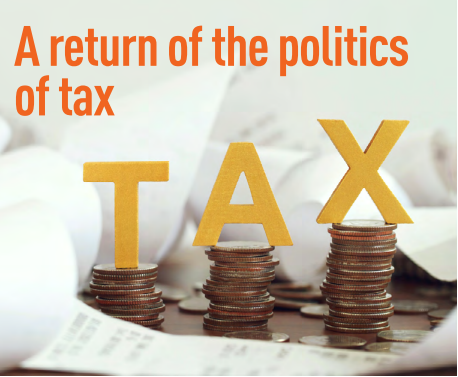A return of the politics of tax

Taxation in Kenya has taken a political twist in a week that saw President William Ruto train his guns on former President Uhuru Kenyatta and businesses associated with his family.
Speaking a day after Azimio leader Raila Odinga held a rally at Jacaranda grounds, Ruto claimed that the political gatherings are sponsored by “people who are not willing to pay tax.” His allies and associates at the same time launched social media attacks against the retired President. For some, the reaction showed that the president
was seemingly feeling the heat from the anti-government rallies being organized by
the opposition coalition.
We cannot continue to operate in a space where those in power exempt themselves from paying taxes. Their day is up. Every citizen must pay tax. Even if they sponsor demos so they don't pay tax, they will pay. I am not talking about additional taxes, I am talking about taxes that have been signed into law he said Monday.
Taking their cue from State House, a section of Kenya Kwanza senators on Tuesday asked the national government to look into tax waivers enjoyed by the Kenyatta family during former President Uhuru Kenyatta’s reign. In particular, the senators pointed to the Sh350 million tax waiver enjoyed by NCBA and NIC banks during the merger in 2019.
Speaking on KTN News on Thursday, February 2nd, NCBA Managing Director John Gachora admitted the waiver happened but denied any tax evasion. “I want to assure the public and every Kenyan that should the court find that NCBA was not entitled to that waiver, the day the court makes that determination. I can promise that the following day we will send a cheque of Ksh. 350 million to the exchequer,” said Gachora.
But even as the president and his men turn the screws on the former president through taxation, eyebrows are being raised as to the recent successive withdrawal of court cases featuring Ruto’s allies.
According to the Daily Nation, “mega corruption and tax evasion cases cumulatively worth Sh15 billion have been withdrawn or crumbled since President William Ruto’s administration came to power.” Top on the list of withdrawn cases is that of former National Health Insurance Fund chief executive officer Geoffrey Mwangi over a Sh1.1 billion scandal involving procurement irregularities of an online payment system at the state-run insurer. Other cases withdrawn include the Sh2.2 billion tax evasion case against Communications Authority of Kenya board chair Mary Wambui Mungai as well as the termination of the trial of Deputy President Rigathi Gachagua who was facing charges of over Sh7.3 billion.
Interestingly the Deputy President waded into the tax payment controversy while he officially closed the senator’s retreat in Mombasa on Thursday. “If you have a problem with what we are asking you to pay we are open to
discussions, come and we agree on how to pay little by little. You can pay a billion
every month until you complete it. We have no problem; you don’t have to make
noise. Even the Bible is clear. Give to God what belongs to him and to Caesar what
belongs to Caesar,” Gachagua said.
Ruto’s ambitious and aggressive tax regime is the cornerstone of his administration's
quest to deliver Kenya Kwanza’s promises. While on the campaign trail, Ruto vowed
to reduce the country's debt significantly, but upon assuming office he was hit by the
reality of tough economic times marked by high unemployment, rising inflation and
skyrocketing cost of living.
A month after being sworn in, the President announced that his administration
expects to collect Sh3 trillion in taxes in 2023 and double that in the next five years.
A rebuttal by economist Tony Watima writing in the Business Daily was swift and
scathing.
“That target is close to impossible for the taxman to meet. Let us begin by looking at what Sh3 trillion means for the Kenya Revenue Authority (KRA). In the financial year 2021/2022 that ended in June this year, the KRA collected a new high of Sh2 trillion, so collecting Sh3 trillion means a 50 percent increase in collection within a year.” But Ruto’s administration is unrelenting in its tax policy, the latest a proposal by the National Treasury to increase the cost of excise stamps on a variety of products including cosmetics, confectionery, alcoholic and non-alcoholic beverages, including bottled water, tobacco, and nicotine products.
According to Rajan Shah, the Chairman of Kenya Association of Manufacturers (KAM), the cumulative effect of all these taxes will be detrimental with an increased cost of production and the cost of finished products being passed on to the consumer amidst the rising cost of living.
“This poses a great risk of suppressing the manufacturing sector’s contribution to the Gross Domestic Product (GDP) that has been shrinking over the last five years,” Shah added as quoted by Capital News. And yet this week has seen the government propose new water tariffs that if passed would see Kenyans taxed based on their residential areas, a proposal of taxing fuel products based on their contribution to greenhouse gas emissions and a separate
proposal on a congestion charge which will be a daily variable toll will target vehicles driven in areas with high traffic.
The increase in taxes has now formed a key plank of Raila’s anti-government messaging with the opposition leader urging Kenyans to resist the taxes being levied by the administration, likening President Ruto to the biblical Zacchaeus who was a tax collector.
The increase of taxes and the resumption of charges on bank transfers to mobile money, the proposed increase of taxes on electricity and the excise duty charges are bound to give the Opposition grounds to criticize the Kenya Kwanza administration. The challenge for the administration will be to show that all that is being done will
eventually be for the good of the people.

